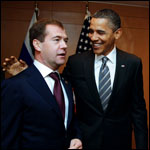Getting STARTed: Short-Term Steps to Advance the Long-Term Goal of Deep Nuclear Reductions James Acton | Carnegie Policy Outlook
The next round of U.S.-Russia arms control presents some truly daunting challenges. Realistically, another arms reduction treaty is likely to be out of reach for the Obama administration, even if it wins a second term. Fortunately, there is much that it could do in the remainder of its first term—unilaterally, bilaterally, and multilaterally—to lay the groundwork for another treaty while reducing nuclear risks.
|
|
R. Jeffrey Smith | Washington Post
The founder of Pakistan's nuclear bomb program asserts that the government of North Korea bribed top military officials in Islamabad to obtain access to sensitive nuclear technology in the late 1990s. Abdul Qadeer Khan has made available documents that he says support his claim that he personally transferred more than $3 million in payments by North Korea to senior officers in the Pakistani military, which he says subsequently approved his sharing of technical know-how and equipment with North Korean scientists. Full Article
Stanley White and Kiyoshi Takenaka | Reuters
Japan's government scrambled to assure wary public Thursday that stress testing nuclear reactors did not call into question their safety after confusion over the plan threatened to delay the first restart of reactors since the March 11 earthquake triggered a radiation crisis. Wednesday's announcement of planned tests prompted the mayor of the southern town of Genkai, who had accepted earlier safety assurances, to call off a planned restart of two reactors at a local plant run by Kyushu Electric Power. Full Article
Arms Control Today
Seven years after they started discussions on the issue and two and a half years after they formulated a "clean text," the members of the Nuclear Suppliers Group (NSG) agreed in June on revised guidelines for exports relating to uranium enrichment and spent fuel reprocessing. At issue were paragraphs 6 and 7 of the NSG guidelines. The old version of paragraph 6 said that suppliers should "exercise restraint" in exports of sensitive technology. Full Article
Julian Borger | The Guardian
A seminar begins tomorrow morning in Brussels hosted by the European Union "to promote confidence building and in support of a process aimed at establishing a zone free of WMD and means of delivery in the Middle East". Similar seminars with similarly clunky titles and lofty aspirations are held all the time in the Belgian capital, but what makes this two-day meeting remarkable is the guest list. Full Article
RIA Novosti
Russia and NATO cannot agree on the establishment of a so-called sectoral missile defense system in Europe, Russian Foreign Minister Sergei Lavrov said on Monday Russia and NATO agreed to cooperate on the so-called European missile defense system at the Lisbon Summit in November 2010. NATO insists there should be two independent systems that exchange information, while Russia favors a joint system with full-scale interoperability. Full Article
|

